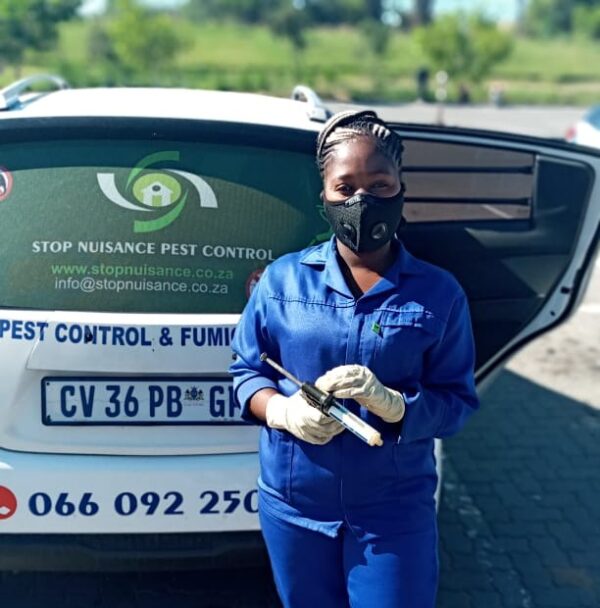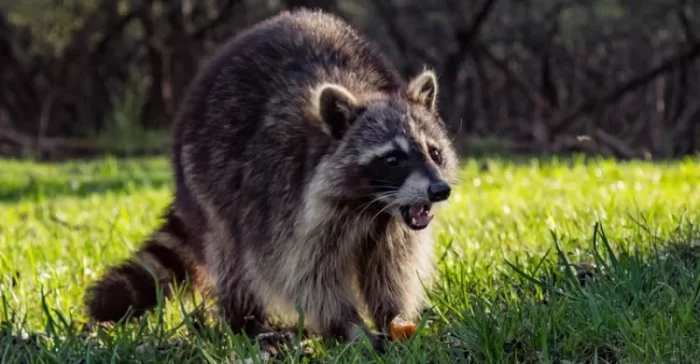Healthy raccoons do not attack people. However, a cornered or threatened raccoon may attack if you don’t back off.
Sometimes, a raccoon will bluff if you try to approach it. Then proceed to growling, huffing, grunting, standing up aggressively to intimidate you. If that fails, it may charge at you or run away.
Table of Contents
Are Raccoons Dangerous to humans, at Night?
- Raccoons pose a threat to your family, and pets for the following reasons:
- Being wild animals, they’re unpredictable.
- Raccoons are formidable fighters. They have sharp claws and teeth, and the strength to inflict significant harm.
Raccoons find their way into the trash. Their fur then attracts harmful bacteria. This is why it is not a good idea to touch a raccoon, even if it is harmless.
Raccoons are the second most linked animal to rabies in the United States. Bats are the no.1 carriers. All it takes is a single bite. And bites are much more likely if a raccoon has rabies because this disease forces raccoons to come up close to humans, rather than keeping a safe distance.
You should never make raccoons feel welcome in your yard. They bring too many problems with them.
ALSO SEE: Can Racoons get Rabies?
Can Racoon Attack?
Yes, a threatened, cornered, or rabid infected raccoon will attack you, members of your family, and pets.
Raccoons can attack humans if provoked or if infected with rabies.
Cats can be attacked by raccoons at night or during the day if the critter considers them as competition.
Raccoons have been known to attack helpless kittens and feed on them thereafter.
Small to medium-sized dogs can be killed by raccoons. Bigger dogs can easily snap the neck of the intruding raccoon real fast.
Yes, raccoons attack and kill chickens as food. Birds like turkeys, ducks, and chickens are easy pickings for raccoons.
Other animals such as pet rabbits and peacocks can also be attacked by raccoons.
See also Do Racoons have Thumbs, Paws or Hands – ANSWER HERE!

What to Do If A Raccoon Approaches You?
- Clap your hands,
- Yell at the raccoon, and step toward it.
That should be enough to get it running in the opposite direction. If that fails, then try:
- A spray with a hose
- Throw tennis balls in its direction (but not at it)
- Bang a pot or use an airhorn to remind the raccoons that you’re a scary predator.
If the raccoons are used to being fed by humans, you may need to be very loud and boisterous to scare them off, but they should still respond.
Warning: If you have tried all these things and the raccoon is unresponsive or does not try to get away or even look up at you, it may have rabies. Back off, and slowly walk away; run if possible then contact a wildlife rehabilitator for advice.
ALSO SEE: Will Racoons Eat Chocolates?
What to Do if a Raccoon Attacks You
Raccoons shod not be attacked, unless it is attacking your pet, you, a family member or property.
Here’s what to do if that happens:
Make sure all skin is not exposed and well covered.
Wear thick gloves and clothing so that their scratches and bites cannot penetrate your skin.
Slip-on a mask, and thick boots, to completely cover yourself up from any danger.
Raccoons are rabies carriers, and doing your best to protect yourself keeps you safe from infection.
A corned raccoon will lash out at you with the aim of causing damage.
If a raccoon is trapped with you blocking off its exits, it will fight back. Remember the goal is to make it run away so DO NOT BLOCK OFF it ESCAPE ROUTES.
A mother raccoon will become more hostile to protect its kits. So, call in an expert for this one.
Raccoons are small and quick on their feet and paws and it’s best that you don’t get too close to it.
See also Can Racoons get Rabies, Shot? FIND OUT!
Once close, a raccoon is able to inflict damage from rapidly scratching and biting you.
Use a stick, chair, or any other type of “long range” weapon that lets you push away the raccoon without getting near it.
This is best applied in a situation where you can’t cover up completely.
If the raccoon is being persistently aggressive then it is best to retreat and call animal control.
Do not try to harm or kill the raccoon. Instead, attempt to push it away from you or your property. The raccoon will almost immediately run away in almost all cases.
If you try to kill or inflict severe damage on the raccoon, it will be more likely to further attack you. So, focus all of your attention on pushing the raccoon away from you or your property instead of hurting it specifically.
Again, if the raccoon is being persistent with staying in your home or attacking you, run away & call for help.
If you’re unable to get the raccoon to leave or if it persistently continues to be aggressive, then the best solution is to run away.
Some people have required several stitches from the damage of raccoons. Other people have contracted rabies.
The best solution is to always call for help, but in order to do so, you need to run away!
You should still call the events in and speak to a wildlife expert near you.
The person will be able to evaluate the situation, give some helpful recommendations, and is able to help prevent further attacks on you or some other persons in the area.
Rabies does not show signs until it becomes deadly. So get you, your pets, and anyone else affected by the raccoon attack checked out as soon as possible to avoid injury or a near-death experience from a disease spread by a raccoon.
Always choose peace over war. If you find a raccoon inside of your home, it’s best to lock him inside the room and let the experts handle it.
See also Can Racoon Dogs Be Pets? How to Care for One!
You could try leaving a single exit open, but this doesn’t always work. The best solution is simply to not get into a fight if at all possible.
Do not aggravate, hunt, or attempt to hurt raccoons. Most raccoons will never attack humans unless they severely feel threatened.
It is not likely that a raccoon will attack you, and if it does it could very likely have a disease making it more aggressive (so get checked ASAP)!
What to Do About Aggressive Raccoons
- Clap your hands,
- Yell at the raccoon, and step toward it.
That should be enough to get it running in the opposite direction. If that fails, then try:
- A spray with a hose
- Throw tennis balls in its direction (but not at it)
- Bang a pot or use an airhorn to remind the raccoons that you’re a scary predator.
If the raccoons are used to being fed by humans, you may need to be very loud and boisterous to scare them off, but they should still respond.
Warning: If you have tried all these things and the raccoon is unresponsive or does not try to get away or even look up at you, it may have rabies. Back off, and slowly walk away; run if possible then contact a wildlife rehabilitator for advice.

With over 5+ years of experience in pest control and a PhD in Entomology, our author brings a blend of scientific knowledge and practical expertise to Pestifier.com. Passionate about creating pest-free environments, they provide effective tips and strategies for managing and preventing pest infestations. Connect on Facebook for the latest updates and insights.

